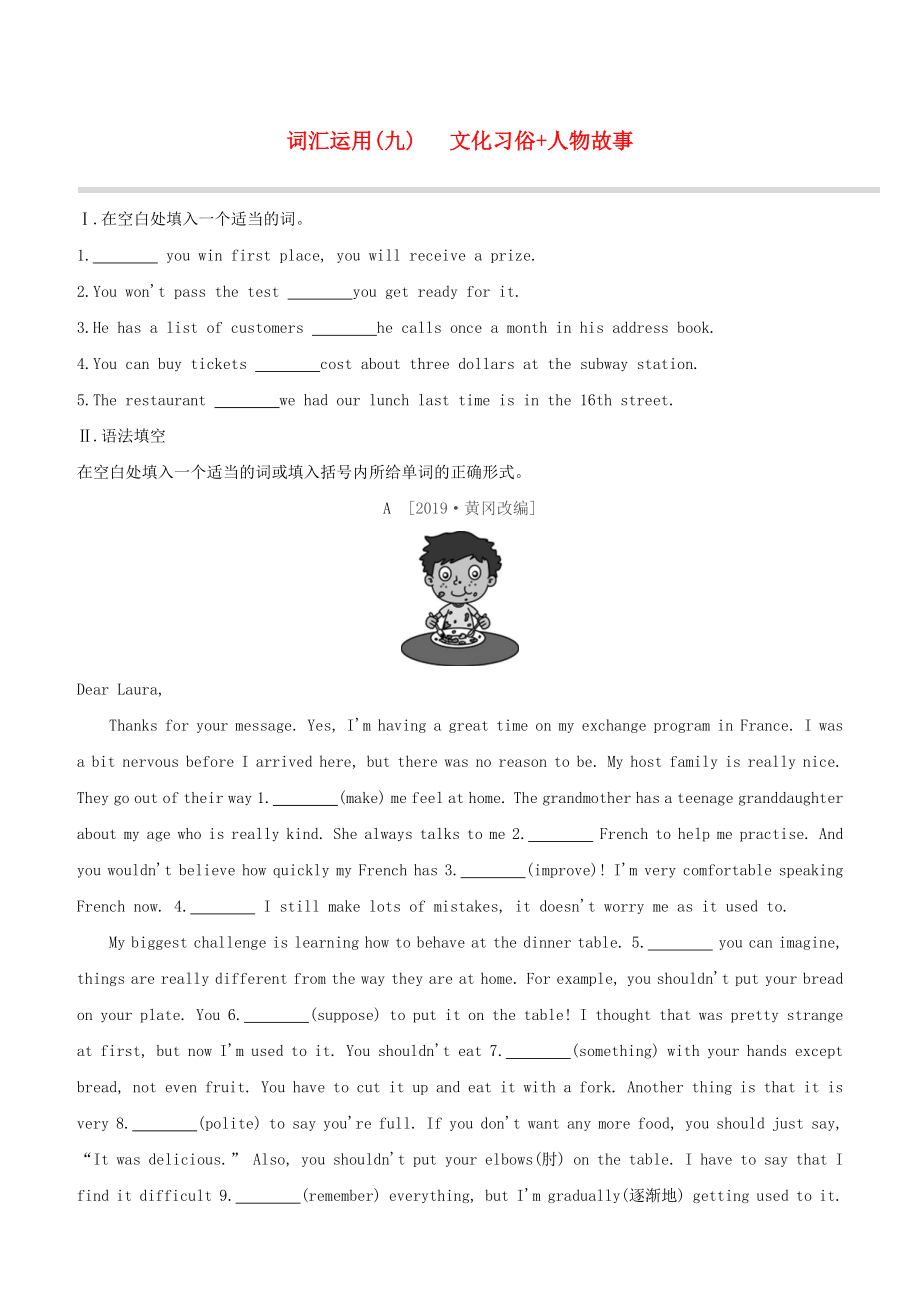《(浙江專版)2020中考英語復(fù)習(xí)方案 語法填空(九)文化習(xí)俗+人物故事試題》由會(huì)員分享,可在線閱讀,更多相關(guān)《(浙江專版)2020中考英語復(fù)習(xí)方案 語法填空(九)文化習(xí)俗+人物故事試題(3頁珍藏版)》請(qǐng)?jiān)谘b配圖網(wǎng)上搜索�����。
1���、詞匯運(yùn)用(九) 文化習(xí)俗+人物故事
Ⅰ.在空白處填入一個(gè)適當(dāng)?shù)脑~。
1. you win first place, you will receive a prize.?
2.You won't pass the test you get ready for it.?
3.He has a list of customers he calls once a month in his address book.?
4.You can buy tickets cost about three dollars at the subway station.?
2�、
5.The restaurant we had our lunch last time is in the 16th street.?
Ⅱ.語法填空
在空白處填入一個(gè)適當(dāng)?shù)脑~或填入括號(hào)內(nèi)所給單詞的正確形式。
A [2019·黃岡改編]
Dear Laura,
Thanks for your message. Yes, I'm having a great time on my exchange program in France. I was a bit nervous before I arrived here, but there was no reason to
3�、be. My host family is really nice. They go out of their way 1. (make) me feel at home. The grandmother has a teenage granddaughter about my age who is really kind. She always talks to me 2. French to help me practise. And you wouldn't believe how quickly my French has 3. (improve)! I'm ver
4、y comfortable speaking French now. 4. I still make lots of mistakes, it doesn't worry me as it used to. ?
My biggest challenge is learning how to behave at the dinner table. 5. you can imagine, things are really different from the way they are at home. For example, you shouldn't put your br
5����、ead on your plate. You 6. (suppose) to put it on the table! I thought that was pretty strange at first, but now I'm used to it. You shouldn't eat 7. (something) with your hands except bread, not even fruit. You have to cut it up and eat it with a fork. Another thing is that it is very 8. (p
6、olite) to say you're full. If you don't want any more food, you should just say, “It was delicious.” Also, you shouldn't put your elbows(肘) on the table. I have to say that I find it difficult 9. (remember) everything, but I'm gradually(逐漸地) getting used to it. I don't find French customs so stra
7����、nge any more. ?
Dear Laura, I'll write again soon and tell you more about my life in France. Hope you are having 10. good school year. ?
Yours,
Lin Yue
B
Charles Darwin was a scientist. And he changed our understanding of the 1. (nature) world.?
Darwin was born in 1809 in England. A
8、t school he didn't do well and got poor 2. (mark). He was a good athlete and loved studying nature as well. He also kept 3. (do) chemistry experiments.?
His father was a doctor and expected Charles 4. (become) one too. Charles started studying medicine 5. Edinburgh University, but so
9����、on he gave up his studies there. He went on to study religion at Cambridge University instead.?
In 1831, Darwin went on a five-year journey to South America, Australia and South Africa by ship. He was seasick, but the things he saw on this trip changed his life. He collected many animal and plant
10、 specimens(標(biāo)本). He spent the rest of his life 6. (study) what he had seen and he wrote many books.?
In 1939, Darwin married his cousin, Emma Wedgwood, with 7. he had ten children! He was a loving father and enjoyed family life, which was always 8. (important)to him than his research. In
11���、 spite of having many health problems throughout his life, Darwin lived 9. he was 73.?
Darwin's most famous book On the Origin of Species came out in 1859 and 10. (sell) out in a day. It said that all living things were related. His ideas were not popular at first, but now most people agre
12�����、e with them and admire Darwin as a great scientist.?
?
【參考答案】
Ⅰ.1.If 2.unless 3.that/who/whom
4.that/which 5.where
Ⅱ.A 1.to make 2.in 3.improved
4.Although/Though 5.As 6.are supposed
7.anything 8.impolite 9.to remember
10.a
B 1.natural 2.marks 3.doing
4.to become 5.at 6.studying
7.whom 8.more important 9.until
10.sold
 (浙江專版)2020中考英語復(fù)習(xí)方案 語法填空(九)文化習(xí)俗+人物故事試題
(浙江專版)2020中考英語復(fù)習(xí)方案 語法填空(九)文化習(xí)俗+人物故事試題

